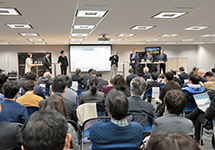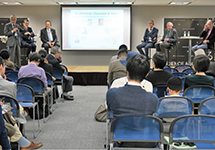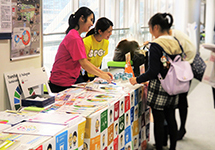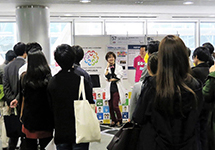http://www.jst.go.jp/EN/about/sdgs/
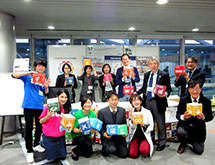
JST considers the UN’s framework of the Sustainable Development Goals (SDGs) to be a critical challenge for Science, technology and innovation (STI). For this reason, JST established a task team in order to discuss STI for SDGs with stakeholders from both inside and outside Japan.
A session titled “Creating Sustainable Future City with STI!; A World that Changes by Achieving the SDGs” was held on November 24th in Science Agora 2017 in which about 160 people from industry, academia, and government attended. Following an introduction of the background by Mr. Satoru Ohtake (Sub-leader of the Task Team), Dr. Aiko Endo (Associate Professor, Specialist in Water-Energy-Food Nexus project, Research Institute for Humanity and Nature (RIHN)) set the tone for the discussion, and then four specialists from Japan, Europe, South Africa, and an international organization, as listed below, talked about their region’s successful actions for SDG11, “Make cities inclusive, safe, resilient and sustainable, which is one of the focus topics of the next UN SDGs forum.”
| -Flavia Schlegel, | Assistant Director-General for the Natural Sciences at UNESCO |
| -Daan du Toit, | Deputy Director-General for International Cooperation and Resources, Department of Science and Technology, South Africa |
| -Isamu Takahara, | General Manager, BR-Frontier Research in Policy and Technology Department, Toyota/Director and Specially Appointed Professor, R&D Center for Frontiers in Policy and Technology, University of Tsukuba |
| -Philippe Vialatte, | Acting Director-General for Research and Innovation, European Commission |
Next, on behalf of youth who will be responsible for the next generation, Mr. Sippakorn Khaimook, a research student (e-ASIA Japanese Government Scholarship), Osaka University, and Mr. Katsuhito Okubo, a representative of Japan Youth Platform for Sustainability (JYPS), talked about the future they envision for city and transportation systems with human-centered infrastructure, and city planning and design utilizing digital technology harnessing their specialty.
The audience engaged in a discussion beginning from the concept of an ideal city and concluding that the “realization of the SDGs mechanism should be implemented by utilizing the intellectual assets of multiple stakeholders with consideration of differences between the history, culture, politics, and environmental systems of local cities.” Following this, Dr. Endo announced that the summary of this discussion would be utilized for international frameworks, such as STI forum and Future Earth. Lastly, Takao Kuramochi, Leader of the Task Team, proposed the establishment of an SDGs platform in which synergies are created by sharing experiences and communicating with many stakeholders. The first day thus came to a successful close.
On the second day, November 25th, a session titled “Strengthening Science-Policy Interface for Achieving Sustainable Development Goals: Challenges to Scientific Advice for Policy Making” was held. Mr. Satoru Ohtake posed issues, and then three speakers introduced science advisory systems, such as government science advisors, advisory boards, and academies, in Japan, Europe, and South Africa respectively and initiatives for the attainment of the SDGs.
The speakers were Dr. Teruo Kishi, Science and Technology Advisor to the Minister for Foreign Affairs; Mr. Leonidas Karapiperis, Minister-Counsellor and Head of the Science and Technology Section, Delegation of the European Union to Japan; and Mr. Daan du Toit, Deputy Director-General for International Cooperation and Resources, Department of Science and Technology, South Africa. Then, Mr. Peter Tindemans, Secretary General of EuroScience, pointed out that the differences and characteristics among each project, nation, and region should be carefully considered and that, because many factors are reciprocally related in the attainment of SDGs, a systematic approach is required. Furthermore, Dr. David Cope, Former Director, UK Parliamentary Office of Science and Technology, noted that a scientific approach is necessary to understand and deal with the relationship between the goals of the SDGs.
Facilitated by Prof. Tateo Arimoto, Principal Fellow, Center for Research and Development Strategy (CRDS), JST/ Professor, National Graduate Institute for Policy Studies (GRIPS), about 80 attendants discussed and shared projected subjects, such as the creation of roadmaps as a prerequisite of structured knowledge; the need for discussion that includes policy makers, citizens, and younger generations; and the importance of not degrading research which is driven by the curiosity of scientists and researchers.
During all three days of the event, an exhibition titled “Science Agora × Sustainable Development Goals (SDGs)
-Create Sustainable Future by Solving Riddles-” was held with the cooperation of “xSDG Laboratory”, Keio Research Institute at SFC; the United Nations Information Centre; and Yoshimoto Kogyo Co., Ltd. About 500 visitors across a broad demographic range such as families, researchers, and government officials thought about what they themselves could do for SDGs utilizing science in daily life and in the future.
We prepared three stages for the program. The first stage was “Challenge yourself with riddles.” Visitors chose two panels from 17 SDGs with stumps of popular comedians’ faces, then they tried to find the solutions of these pairs of goals. Then, visitors took pictures for Instagram with two panels on which they put messages to express their will to achieve the SDGs. This activity was called “Send out.” The final stage was “Learning.” Posters were exhibited for learning about the SDGs. Although the awareness of the visitors about SDGs was around 20%, they provided various useful suggestions toward the attainment of the SDGs. For example, an elementary school student answered straightforwardly that the solution to SDG11, “sustainable cities and communities,” is “to love your own town.” There were more technical answers too, such as “production of microbial proteins using waste edible oil as a carbon source” for SDG2, “Zero hunger.” “Prof. Kuro-love,” a comedian at Yoshimoto Creative Agency, was invited as a special guest. In his live performance, Prof. Kuro-love amusingly explained that “SDGs are an opportunity for research and business too” making use of his background as a professor. He drew crowds of people to his booth every time he performed. The strong power of comedy greatly lowered people’s barriers towards the SDGs. Reports of this event will be provided on the website of Science Agora.
xSDG Laboratory, Keio Research Institute at SFC
http://www.kri.sfc.keio.ac.jp/en/lab/xsdgl.html
The United Nations Information Centre
http://www.unic.or.jp/info/un_agencies_japan/unic/?lang=en
Yoshimoto Kogyo Co., Ltd
http://www.yoshimoto.co.jp/sdgs/sdgs20171124.html (Japanese Only)
Prof. Kuro-love (Talent of Yoshimoto Creative Agency Co., Ltd.)
https://blogs.yahoo.co.jp/kurolovekyouzyu_blog/41075544.html (Japanese Only)
